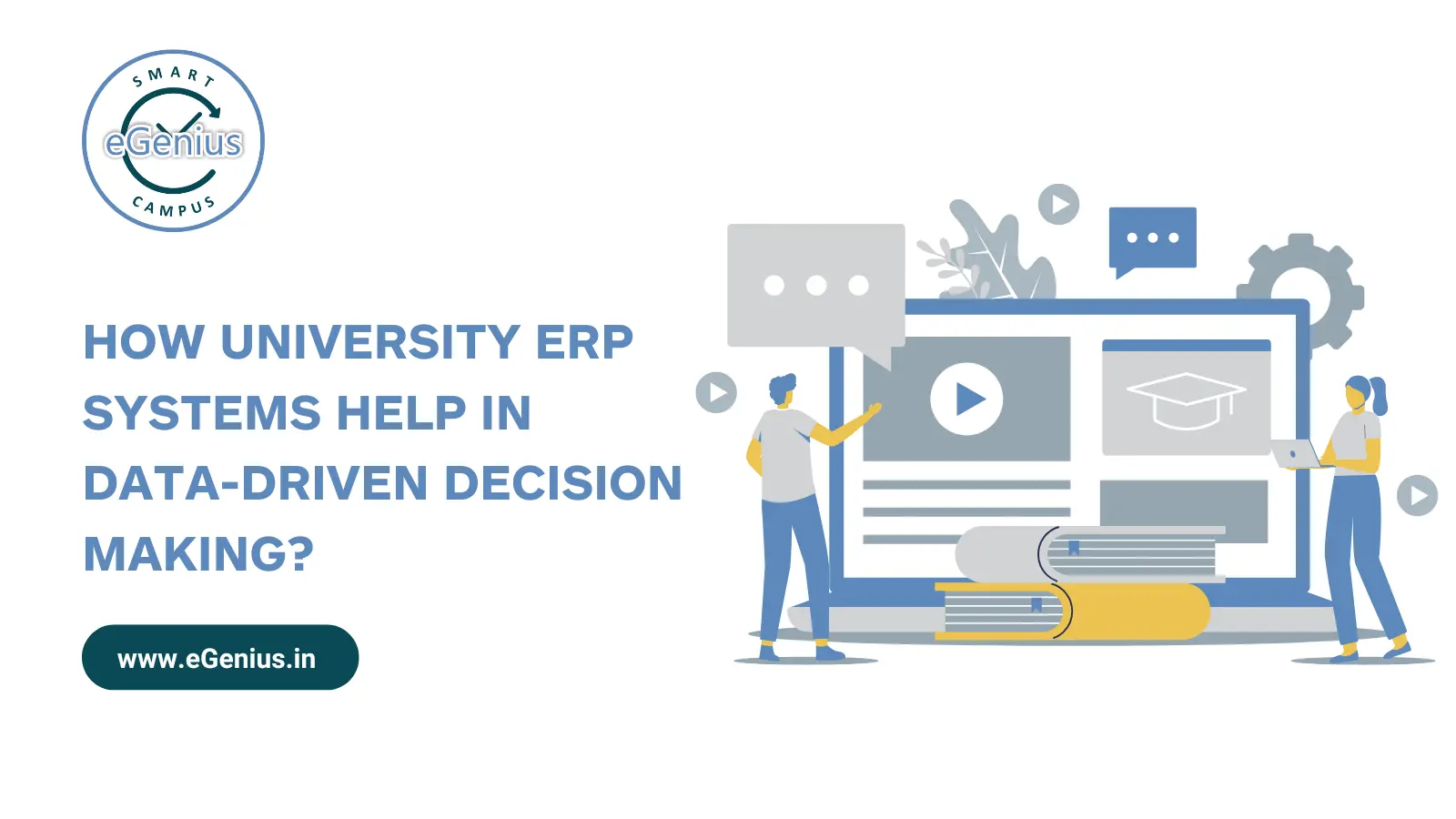In today’s competitive academic landscape, universities must not only manage operations efficiently but also make informed decisions swiftly. With the surge in student enrollment, diverse program offerings, and increasing administrative complexity, more than traditional management approaches are required. This is where University ERP Systems come into play. These robust platforms streamline data management and facilitate data-driven decision-making, which enhances institutional efficiency and long-term success.
As the world of higher education continues to evolve, universities face growing pressure to optimize their operations and deliver a seamless experience for students, staff, and faculty. However, running a university involves much more than just academic activities. Administrative processes like admissions, fee management, examinations, and human resource management are equally crucial. With the vast amount of data generated from these processes, universities need effective systems to gather, process, and analyze this information efficiently. This is where a University ERP system becomes a critical tool for institutions. University ERP systems empower educational institutions by centralizing their data, automating processes, and offering powerful analytical capabilities, leading to better decision-making.
What is a University ERP System?
A University ERP (Enterprise Resource Planning) system is a comprehensive software solution designed to integrate and manage all aspects of a university’s operations. From student enrollment, academic management, and finance to human resources and library systems, it creates a unified platform for efficient administration. By consolidating data into a centralized database, a University ERP provides real-time access to information across departments, allowing administrators, faculty, and students to interact with accurate and up-to-date information.
The ERP system streamlines day-to-day processes and supports the university’s strategic goals, such as improving student outcomes, optimizing resource allocation, and ensuring compliance with regulations.
The Role of Data in Modern University Operations
Data plays an increasingly pivotal role in managing modern university operations. Here are some ways data impacts university management:
- Enrollment and Admissions: Data, including applicant profiles, enrollment numbers, and program popularity, helps track and manage the admissions process.
- Student Performance Monitoring: Institutions can analyze student performance trends to identify at-risk students and enhance academic support.
- Resource Allocation: Data ensures effective allocation of financial, human, and material resources across departments.
- Compliance and Reporting: Universities must collect and report accurate data for accreditation, funding, and government compliance.
- Operational Efficiency: Data-driven insights help streamline administrative processes, reducing manual tasks and errors.
- Financial Management: Institutions use data to manage budgets, monitor expenditures, and optimize financial planning.
- Strategic Planning: University leadership relies on data to guide long-term planning and decision-making related to growth, partnerships, and new program development.
Make university management system user-friendly
How University ERP Systems Facilitate Data-Driven Decision Making?
University ERP systems are critical enablers of data-driven decision-making for several reasons:
- Data Centralization: By integrating multiple departments under one system, University ERP centralizes all data into a unified database. This ensures that decision-makers have access to accurate, consistent, and real-time data from different areas of the institution.
- Automated Reporting: University ERP systems automate the process of generating reports, whether for student performance, financial management, or compliance purposes. This eliminates manual work and reduces errors, allowing university leaders to base their decisions on accurate data.
- Predictive Analytics: Some ERP systems come equipped with predictive analytics capabilities. Using historical data, university administrators can forecast trends such as enrollment patterns, student retention rates, and financial health.
- Real-Time Data Access: ERP systems provide real-time data access, enabling faster, more accurate decision-making. Whether during strategic planning meetings or addressing daily operational challenges, having real-time data ensures that decisions are timely and relevant.
- Customizable Dashboards: Most University ERP systems feature customizable dashboards for different institutional roles. Whether you are a department head, a financial officer, or a registrar, you can access data relevant to your needs, improving the quality of decision-making.
- Error Reduction: Since ERP systems reduce reliance on manual data entry and multiple disconnected systems, errors related to data inconsistency or duplication are minimized. This leads to more reliable data for decision-makers.
Key Areas Where ERP-Driven Data Supports Decision-Making
Several critical areas benefit from the University ERP system when it comes to data-driven decision-making:
- Admissions and Enrollment: By analyzing data on applicant demographics, past enrollment trends, and program preferences, universities can therefore refine their recruitment strategies to target the right students.
- Academic Planning: Data from ERP systems helps track course demand, faculty workload, and classroom utilization. Consequently, departments can plan better for upcoming semesters, avoiding underutilization or over-enrollment in specific courses.
- Financial Management: ERP systems provide insights into budget allocation, expenditures, and revenue streams. As a result, financial officers can make data-backed decisions about cost-cutting, investments, and economic forecasting.
- Human Resources: With access to ERP-driven data on staff performance, hiring trends, and payroll, HR departments can optimize their workforce management and streamline recruitment processes.
- Student Success Initiatives: ERP systems’ data analytics can thus identify patterns related to student retention, graduation rates, and academic performance, allowing universities to implement timely interventions for at-risk students.
The Impact of Real-Time Decision Making
Real-time decision-making has become a game-changer for universities, and University ERP systems make this possible in multiple ways:
- Faster Response to Challenges: When faced with operational issues, such as faculty shortages or budgetary constraints, university leaders can respond promptly by leveraging real-time data from ERP systems. Quick decision-making prevents bottlenecks and ensures smooth operations.
- Enhanced Strategic Planning: University leaders can use real-time data for strategic planning, such as launching new programs or expanding campus facilities. Having access to the most current data reduces the risk of misinformed decisions.
- Improved Resource Utilization: With real-time data on classroom occupancy, staffing needs, and financial resources, universities can therefore make adjustments quickly to optimize resource use, saving costs and improving efficiency.
- 4o
- Better Student Support: Real-time academic data allows universities to intervene earlier when students struggle, leading to improved student outcomes and higher retention rates.
- Compliance and Accreditation: Real-time reporting therefore ensures that universities meet compliance requirements quickly and accurately.This minimizes the risk of penalties and enhances the institution’s reputation for transparency and accountability.
In a data-driven world, universities can no longer rely on intuition or outdated systems to make decisions. Implementing a University ERP system offers a wealth of benefits, from streamlining daily operations to facilitating informed, data-driven decisions that shape the institution’s future. With centralized data, real-time reporting, and advanced analytics, ERP systems empower universities to stay competitive, improve operational efficiency, and provide better experiences for students and staff alike. Ultimately, the power of data-driven decision-making with the help of University ERP systems ensures that universities are well-equipped to face modern challenges and seize new opportunities.















